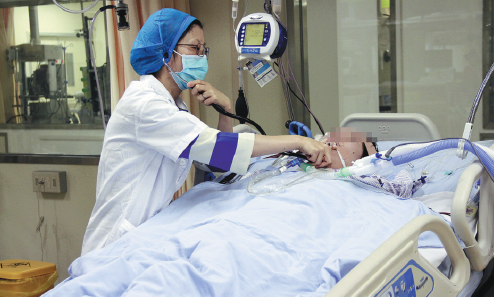HK doctor answers call of duty again
ICU specialist who battled 2003 SARS outbreak stayed in Shenzhen to help coronavirus fight


"It was a very gloomy time," said Hong Kong doctor Chak Kwan Tong of the city's battle against severe acute respiratory syndrome in 2003.
Tong was working around the clock at the intensive care unit of Hong Kong's Princess Margaret Hospital, while trying to take care of two children on her own as her husband was overseas on business.
The hospital was admitting all confirmed SARS patients and the capacity of the ICU had increased from 12 to 42 beds in a few days, with limited manpower to treat the patients. "Nobody wants to repeat that experience," Tong said.
However, 17 years later she is battling another epidemic after moving to the University of Hong Kong-Shenzhen Hospital in 2015.
The hospital was designated to treat suspected novel coronavirus infections in Shenzhen, Guangdong province. The sickest patients are sent to the ICU, which Tong supervises.
Her experience fighting SARS has been invaluable. Tong has trained her colleagues in prevention and control measures and how to devise an emergency plan to cope with a possible outbreak in the city.
"We not only practice how to put on and take off protective items correctly, but also how to handle high-risk suspected patients while ensuring medics' safety," Tong said.
She concedes: "Like everyone else, with the uncertainty about the infection, I am also scared of novel coronavirus infection."
Into the breach
However, Tong could have chosen not to place herself on the front line on the Chinese mainland.
On Feb 8, the Hong Kong Special Administrative Region government imposed a compulsory 14-day quarantine on those who had visited the mainland.
Tong had been working in Shenzhen during the day and returning to her Hong Kong home at night.
Her family suggested she work remotely from home under the quarantine policy.
However, Tong said she followed her heart and has stayed in Shenzhen since Feb 10, promising her family that she would protect herself.
She began by preparing the hospital's ICU for possible admissions and a surge in critically ill patients.
"I had to take care of the patients. I couldn't leave my patients and colleagues at this critical time. It's my duty," she said.
More than 20 of her Hong Kong colleagues working at the hospital made the same decision and they have remained in Shenzhen since Feb 10.
Tong has a tight schedule and starts work before 8 am. She examines and treats critically ill patients in the ICU, discusses operational issues and attends the daily handover.
Xu Xiaoping, secretary of the Party committee of the hospital, said Tong was recruited as a member of Guangdong's expert team at the beginning of the outbreak.
"Tong's invaluable experience in fighting SARS helps us a lot in fighting the novel coronavirus," Xu said.
Well qualified
Tong graduated from the University of Hong Kong in 1990 and her interest in infectious diseases led her to do further studies and obtain a master's degree in the area.
She has undergone training in other clinical areas related to intensive care including: resuscitation; trauma; extracorporeal membrane oxygenation; ultrasound examinations; aeromedical transport; and simulation training.
In 2017, she led a team that cured a 26-year-old patient who had lost lung function due to a cold, using ECMO support.
It was the first time a patient in Shenzhen had been treated with an ECMO machine, which can temporarily perform the job of the lungs while they recover.
Du Qian, a doctor who participated in the 2017 treatment, said Tong had prepared them well for the new technology.
"Before we used ECMO to treat patients, Doctor Tong sent medical staff members in the ICU to receive training in Hong Kong," Du said. "She also led mock drills and fully prepared medical staff members to use the machine."
ECMO is an effective way to treat critically ill novel coronavirus patients. However, medical workers are at high risk of being infected if they cannot precisely connect a big tube to one of the patient's veins.
About half of the suspected patients in the Shenzhen hospital's ICU were confirmed to have the coronavirus.
No medical staff member has become infected, she added.
Du, who has worked with Tong for three years said she is very professional, constantly updates her knowledge and shares it with her colleagues.
Tong, who recently visited her family for the first time in six weeks, has urged people overseas to self-isolate during the pandemic.
"The epidemic control in China was efficient with a clear goal-curb the virus spread by quarantine," she said. "I hope to stroll outside without wearing a face mask when the virus is defeated."
- Xinjiang county blends heritage, modern services for Spring Festival
- Our Spring Festival, Our Way
- China launches emergency response for meteorological disasters
- Chinese scientists develop AI model to push deep-space exploration
- Xiplomacy: Xi's letter renews American friends' commitment to better China-US ties
- Inner Mongolia showcases horse culture at winter photography festival





































